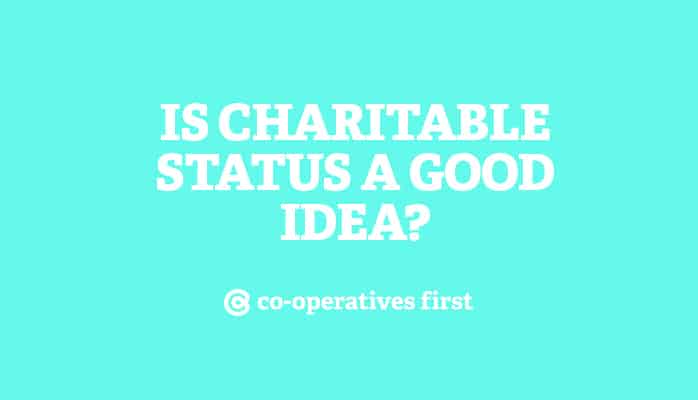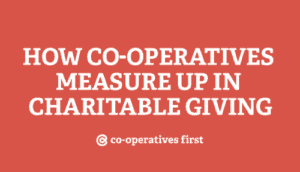Collecting charitable donations is a popular way to raise funds. Money is always better when you don’t have to pay it back, right? Maybe. But everything comes with a cost – whether you pay directly out of pocket or not.
Of course, “free” money and a tax write-off for donors does highlight an advantage for some types of organizations – and some of those organizations are co-ops. So, it can make sense for co-op entrepreneurs to look at charitable status as a revenue option.
But is charitable status right for your co-op? The short answer: probably not.
First, getting and keeping charitable status is hard and it takes a long time. Plus, this unique tax status may not give your organization the advantages you’re hoping for.
Moreover, if we go by the numbers, it’s also not very popular for co-operatives. Out of the 85,000 registered charities in Canada, only 250 are co-ops.
Let’s look at why.
Non-profit and charity are not the same thing
While often used interchangeably, the terms “charity” and “non-profit” aren’t the same thing. All charities are non-profits, but not all non-profits are charities.
Both non-profits and charities can accept donations, but only charities can issue tax-deductible receipts to those who donate. Why is this? Charities are given a special tax status by the federal government.
To get this status, an organization must apply to the Canada Revenue Agency (CRA). The process is long and tedious, and the rules are strict.
But, if you’re sure most of your co-op’s revenue will come through donations, applying for charitable status might be the right move.

When is charitable status a good idea?
Co-ops that provide a public good or service and have access to a pool of generous donors should consider going the charitable status route. Donors are a lot more likely to write a cheque if they can get a tax-deductible receipt.
Most organizations that choose this path register as charities before they officially launch. Having charitable status from the get-go allows the venture to raise start-up funds and provides an opportunity to start building critical networks and relationships early in the organization’s life.
But what does it take to get this special tax status?
First, your co-op needs the right purpose
Because the government decides who gets charitable status, it also sets the guidelines. They base much of their decision on your organization’s purpose.
To be a registered charity, the organization must have a “charitable purpose”. Four categories qualify:
- Relief of poverty (low-income housing)
- Advancement of education (educational institutions)
- Advancement of religion (churches)
- Other purposes that benefit the community (promoting sport, health, culture, etc.)
If your co-op is hoping for charitable status, its purpose needs to fall under one of those four categories. In Canada, co-ops with charitable status tend to be related to childcare, community halls, and seniors housing, but also include things like film pools, community clinics, and cemeteries.

Also, your co-op should benefit “the public”
The CRA says a charity “must be established for public benefit”. So, a charity can’t exist to benefit private or personal interests. Because co-ops exist to serve their member shareholders, rather than the public at large, this can present a problem.
Most co-ops provide benefits through things like patronage dividends and member-only services. Not surprisingly, the CRA says these are “personal benefits.” Also, some co-ops pay their board members. This too is a personal benefit and is not allowed. A charity’s board must consist of volunteers who cannot receive direct monetary benefit from the position.
To get charitable status, a co-op chooses to rely on donations, grants, and loans for revenue and needs to be non-profit and volunteer-driven. The only type of co-op that might fit this scenario is a community service co-operative.
RELATED: Community Service Co-ops and Non-Profits: What’s the difference?
So, is charitable status worth it?
To make this decision, you need to weigh the following pros and cons.
First, are you able to make a go of it on donations and grants? If so, will the donations also cover the extra costs involved in being a charity, like having to pay an auditor and a bookkeeper to file and manage the annual paperwork to keep your status valid?
A feasibility study can help you answer these questions.
Next, you should know getting charitable status can be a long-term and expensive commitment. Registering as a charity can sometimes take up to a year. Plus, it’s a good idea to get help from a lawyer during this process, which isn’t cheap.
Also, while some charities raise huge sums of money from charitable donations, for others they make up only a small fraction of their revenue.
For example, United Way of Calgary received over $48 million in receipted donations in 2017. In contrast, the Albert Childcare Co-operative in Saskatoon – also a charity – received $0 from charitable donations in 2017. Instead, 75% of its revenue came from parent fees and 25% from government funding.
Not sure if charitable status is right for your co-op? Contact us! We can help you figure it out.

 Written by
Written by 


